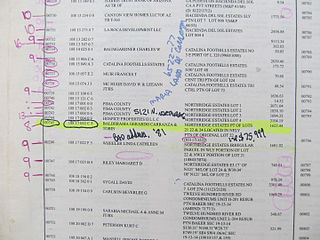In law, conveyancing is the transfer of legal title of real property from one person to another, or the granting of an encumbrance such as a mortgage or a lien. A typical conveyancing transaction has two major phases: the exchange of contracts and completion.
A lien is a form of security interest granted over an item of property to secure the payment of a debt or performance of some other obligation. The owner of the property, who grants the lien, is referred to as the lienee and the person who has the benefit of the lien is referred to as the lienor or lien holder.
A mortgage is a legal instrument of the common law which is used to create a security interest in real property held by a lender as a security for a debt, usually a mortgage loan. The corresponding term in civil law jurisdictions is hypothec.
Title insurance is a form of indemnity insurance predominantly found in the United States and Canada which insures against financial loss from defects in title to real property and from the invalidity or unenforceability of mortgage loans. Unlike some land registration systems in countries outside the United States, US states' recorders of deeds generally do not guarantee indefeasible title to those recorded titles. Title insurance will defend against a lawsuit attacking the title or reimburse the insured for the actual monetary loss incurred up to the dollar amount of insurance provided by the policy.

Foreclosure is a legal process in which a lender attempts to recover the balance of a loan from a borrower who has stopped making payments to the lender by forcing the sale of the asset used as the collateral for the loan.

A tax lien is a lien imposed by law upon a property to secure the payment of taxes. A tax lien may be imposed for delinquent taxes owed on real property or personal property, or as a result of failure to pay income taxes or other taxes.
A mechanic's lien is a security interest in the title to property for the benefit of those who have supplied labor or materials that improve the property. The lien exists for both real property and personal property. In the realm of real property, it is called by various names, including, generically, construction lien. The term "lien" comes from a French root, with a meaning similar to link; it is related to "liaison". Mechanic's liens on property in the United States date from the 18th century.
An assignment is a legal term used in the context of the law of contract and of property. In both instances, assignment is the process whereby a person, the assignor, transfers rights or benefits to another, the assignee. An assignment may not transfer a duty, burden or detriment without the express agreement of the assignee. The right or benefit being assigned may be a gift or it may be paid for with a contractual consideration such as money.
A land patent is a form of letters patent assigning official ownership of a particular tract of land that has gone through various legally-prescribed processes like surveying and documentation, followed by the letter's signing, sealing, and publishing in public records, made by a sovereign entity.

In finance, a security interest is a legal right granted by a debtor to a creditor over the debtor's property which enables the creditor to have recourse to the property if the debtor defaults in making payment or otherwise performing the secured obligations. One of the most common examples of a security interest is a mortgage: a person borrows money from the bank to buy a house, and they grant a mortgage over the house so that if they default in repaying the loan, the bank can sell the house and apply the proceeds to the outstanding loan.
The Offer in Compromise program, in the United States, is an Internal Revenue Service (IRS) program under 26 U.S.C. § 7122 which allows qualified individuals with an unpaid tax debt to negotiate a settled amount that is less than the total owed to clear the debt. A taxpayer uses the checklist in the Form 656, Offer in Compromise, package to determine if the taxpayer is eligible for the offer in compromise program. The objective of the OIC program is to accept a compromise when acceptance is in the best interests of both the taxpayer and the government and promotes voluntary compliance with all future payment and filing requirements.
In real estate business and law, a title search or property title search is the process of examining public records and retrieving documents on the history of a piece of real property to determine and confirm property's legal ownership, and find out what claims or liens are on the property. A title search is also performed when an owner wishes to sell mortgage property and the bank requires the owner to insure this transaction.
In Mechanics lien law a Preliminary Notice is a notice sent by the general contractor, subcontractor, materialmen, equipment lessors or other parties to a construction project not to create a Mechanics lien but rather to establish the right to file a Mechanics lien in the event of nonpayment. The distinction is important. If the Preliminary Notice is sent but the claimant's bill is paid, the Preliminary Notice has no further legal effect. However, if the bill is not paid the claimant may now file a Mechanics lien on the owner's property. Most states do not allow the filing of a Mechanics lien without claimants being able to prove they first sent a Preliminary Notice.
The maritime lien is one of three in rem claims capable of being brought under UK Admiralty Law. Whilst being a common law instrument, it has been codified under s.21(3) of the Senior Courts Act 1981 along with s.21(2) and s.21(4), its statutory counterparts. Maritime lien and ship mortgage have a single corresponding term in the civil law, namely the ship hypothec.

A tax sale is the forced sale of property by a governmental entity for unpaid taxes by the property's owner.
A construction loan is any value-added loan where the proceeds are used to finance construction of some kind. In the United States Financial Services industry, however, a construction loan is a more specific type of loan, designed for construction and containing features such as interest reserves, where repayment ability may be based on something that can only occur when the project is built. Thus, the defining features of these loans are special monitoring and guidelines above normal loan guidelines to ensure that the project is completed so that repayment can begin to take place.

A mortgage loan or simply mortgage, in civil law jurisdicions known also as a hypothec loan, is a loan used either by purchasers of real property to raise funds to buy real estate, or by existing property owners to raise funds for any purpose while putting a lien on the property being mortgaged. The loan is "secured" on the borrower's property through a process known as mortgage origination. This means that a legal mechanism is put into place which allows the lender to take possession and sell the secured property to pay off the loan in the event the borrower defaults on the loan or otherwise fails to abide by its terms. The word mortgage is derived from a Law French term used in Britain in the Middle Ages meaning "death pledge" and refers to the pledge ending (dying) when either the obligation is fulfilled or the property is taken through foreclosure. A mortgage can also be described as "a borrower giving consideration in the form of a collateral for a benefit (loan)".
Subordination in banking and finance refers to the order of priorities in claims for ownership or interest in various assets.

Most local governments in the United States impose a property tax, also known as a millage rate, as a principal source of revenue. This tax may be imposed on real estate or personal property. The tax is nearly always computed as the fair market value of the property times an assessment ratio times a tax rate, and is generally an obligation of the owner of the property. Values are determined by local officials, and may be disputed by property owners. For the taxing authority, one advantage of the property tax over the sales tax or income tax is that the revenue always equals the tax levy, unlike the other taxes. The property tax typically produces the required revenue for municipalities' tax levies. A disadvantage to the taxpayer is that the tax liability is fixed, while the taxpayer's income is not.

Foskett v McKeown[2000] UKHL 29 is a leading case on the English law of trusts, concerning tracing and the availability of proprietary relief following a breach of trust.




